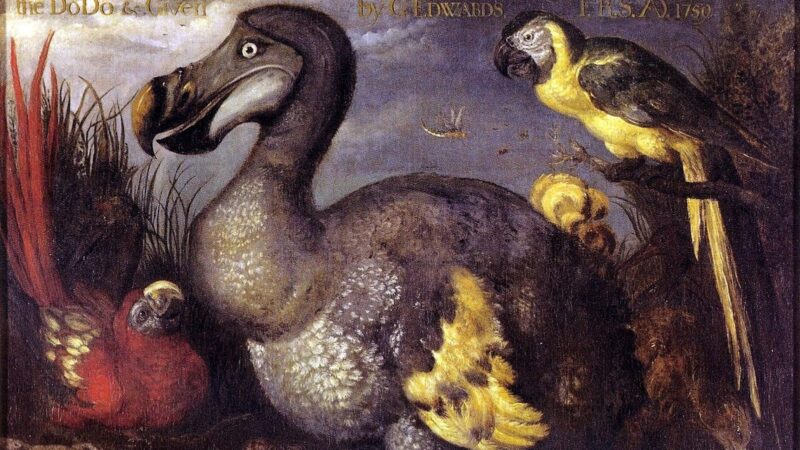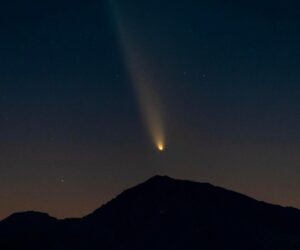A poignant recounting of the tangled and unnatural histories of extinction and empire, and how extinction is not necessarily inevitable but instead, is a political choice.
One of the most famous and often-copied paintings of a Dodo specimen, as painted by Roelant Savery in the late 1620s. The image came into the possession of the ornithologist George Edwards, who later gave it to the British Museum, hence the name. The bird swallowing a frog in the lower right may be the likewise extinct Red Rail. It has also been suggested that the two parrots are the extinct Lesser Antillean Macaw (left) and Martinique Macaw (right). (Credit: Roelant Savery / Natural History Museum, London)
Roelant Savery / Public Domain
Of the six books that are shortlisted for this year’s Royal Society Trivedi Science Book Prize, I was most looking forward to reading Vanished because this book covers one of the topics that I read and think (and worry) about daily: extinction. This meticulously researched and referenced tome doesn’t disappoint: it presents a scholarly and thoughtful examination of our ideas about the natural world, recounts a number of case histories that reveal the reality of how extinction is deeply entangled with colonialism and further shares what extinction means to the world.
“Extinction extinguishes ways of being: distinct lifeways that might exist for millennia, even millions of years, before vanishing,” writes author, historian Sadiah Qureshi, currently a Chair of Modern British History at the University of Manchester, where she is a widely recognized expert on the history of science, race, and empire.
Hardback book cover: Vanished by Sadiah Qureshi (2025; Allen Lane / Penguin Books)
Allen Lane / Penguin Books
“Ways of being are a coalescence of possibilities, a quickening of leaf, wing, scale, and bone into lives we call ‘trees’, ‘bees’, ‘sharks’, ‘tigers’, or ‘human’. Each one is perpetuated by living, reproducing, and growing in communities over innumerable generations. […] We usually discuss extinction as the loss of species, but this often obscures how it robs the world of distinctive existences, many far older than any nation, humanity, and even earth’s continents.” (p. xvi)
Vanished: An Unnatural History of Extinction (2025; Allen Lane / Penguin Books; 470 pages long, including 4 pages of Acknowledgements, 88 pages of chapter Notes, 74 pages of Selected Bibliography, and a 21 page Index) is packed with important historical, scientific and political information that will benefit everyone involved with the conservation of endangered species. But this book goes further than animal and plant species; it also investigates and reports on the dispossession of Indigenous peoples around the world, and how their extinction became a political idea – an inevitability, actually – linked to empire, genocide, and environmental change.
This book is divided into two parts, each comprising five chapters with each chapter containing a variable number of subchapters. The first half of the book mainly focuses on the dispossession and extinction (extermination, mostly) of Indigenous peoples; their customs, cultures and languages due to wanton persecution by white European settlers who invaded their lands and destroyed their ways of life. Professor Qureshi also discusses how Europeans and Americans quickly adopted the notion that extinction was a natural process to assuage their guilt and to justify their own role in the mistreatment and genocide of Indigenous peoples. As Professor Qureshi quotes one of her sources: “the English nation … may have affixed to its character the indelible reproach of having extirpated a whole race of people.” (p. 40)
Well, several races of people, actually.
The second half of the book focuses mostly on the extinction of non-human animals and plants, and the process that scientists used to decide which beings were endangered and therefore, might be legally entitled to protection from farming, hunting and other forms of human overexploitation. In this part of the book, we read the tragic stories of the passenger pigeon and the thylacine as well as the remarkable near-extinction of almost all of the world’s great whales. Surprisingly (because plants are so often ignored or overlooked), Professor Qureshi includes a very interesting chapter about the Wollemi pine, which I’d never heard of before. This vanishingly rare tree was serendipitously discovered in a remote gorge in the Blue Mountains in Australia, and was quickly deemed to be a ‘living fossil.’
Overall, this is a dark book in many ways as it documents some of the many terrible acts that humans have done to animals and plants as well as to our fellow humans. In Vanished, Professor Qureshi holds up a mirror so we can see how colonialism, greed and destructiveness have created so many pressing problems that we are still confronting today.
Many things that I read in this book surprised me. For example, I found it strange that the extinction of animals was thought to be a problem worth solving long before anyone extended that same interest and care towards humans. Additionally, I never knew that the threat of extinction helped with the establishment of national parks in the United States: not only were America’s national parks viewed as monuments of unmatched splendor that were agriculturally or commercially worthless, but they also were formerly occupied by many dispossessed Indigenous peoples.
“The expectation that Native peoples would soon be extinct contributed to the establishment of national parks,” Professor Qureshi writes. “California established Yosemite as the first state park in 1864, and Yellowstone soon followed as the world’s first national park in 1872. […] The crown jewels of American national heritage, national parks were consistently carved out from Native territories while perpetuating the notion of an unpeopled American wilderness.” (p. 70-71.)
Vanished is a compassionate exploration of the tangled and unnatural histories of extinction and empire. Professor Qureshi skilfully interweaves fascinating original research and compelling storytelling to show us that extinction is both an evolutionary process and a human act: one that illuminates our past, and may alter our future. Highly recommended.
Tragically, whilst writing this book, the Yangtze dolphin, the West African black rhino and the golden toad of Costa Rica were all declared extinct. “Extinction is a political choice,” Professor Qureshi observed.
Vanished: An Unnatural History of Extinction was shortlisted for the 2025 Royal Society Trivedi Science Book Prize.
© Copyright by GrrlScientist | hosted by Forbes | LinkTr.ee
Socials: Bluesky | CounterSocial | LinkedIn | Mastodon Science | Spoutible | SubStack | Threads | Twitter
NOTE: The Royal Society purchased a hardback copy of this book for me in exchange for my honest, unbiased review. No AI tools were used in the writing or editing of this review.









